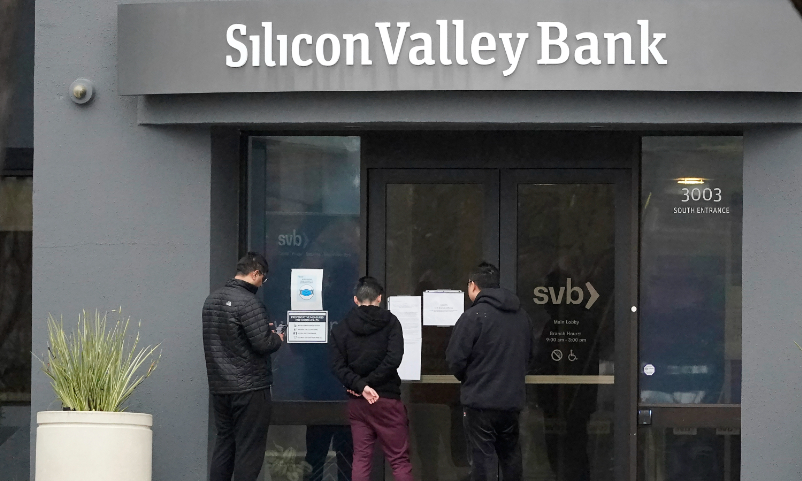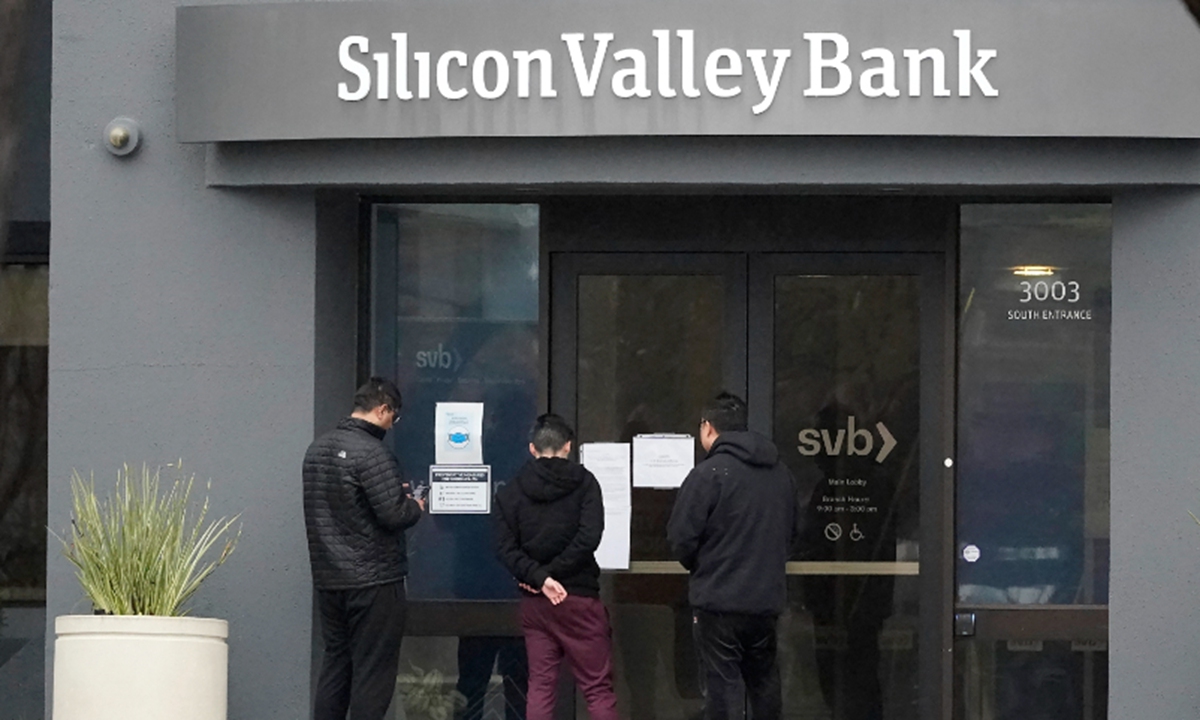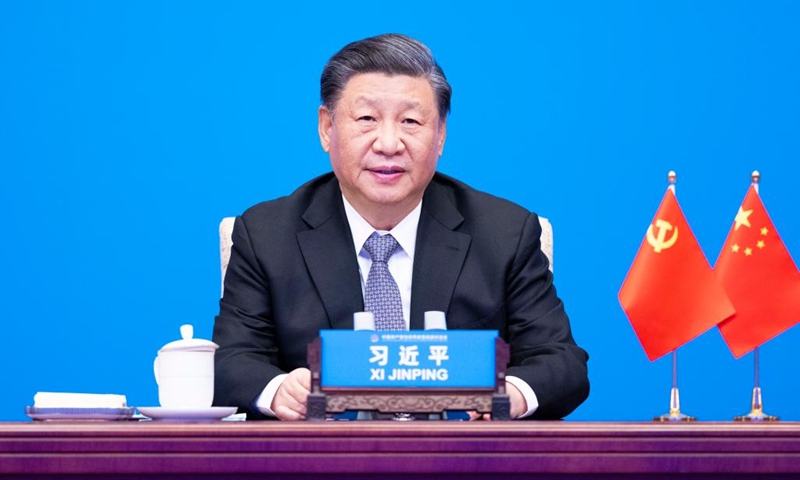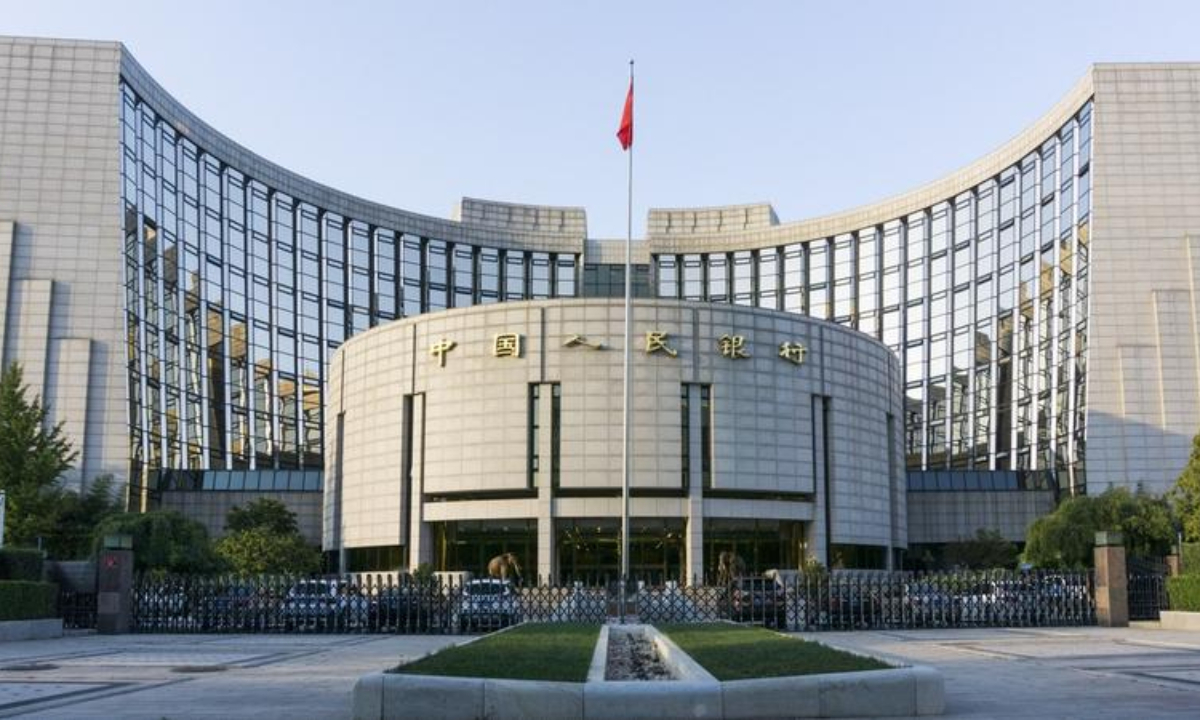Xi Jinping, general secretary of the Communist Party of China (CPC)
Central Committee and Chinese president, attends the CPC in Dialogue with World Political Parties High-Level Meeting via video link and delivers a keynote address in Beijing, capital of China, on March 15, 2023. Photo: Xinhua
Global Civilization Initiative proposed by Xi 'provides hope to heal the world in turbulence'
Xi Jinping, general secretary of the Communist Party of China (CPC) Central Committee and Chinese president, proposed the Global Civilization Initiative. Experts said following the Global Development Initiative and the Global Security Initiative, China is trying to share its wisdom and plans to bring new hope for all nations to consider together on how to escape the trap of the "Clash of Civilizations" and find a path that can help the world sail through the current turbulence.
Xi proposed the initiative during his
key note speech on Wednesday at the opening ceremony of the CPC in Dialogue with World Political Parties High-Level Meeting via video link and delivered a keynote address.
Under the initiative, Xi called for respect for diversity of civilizations, advocating the common values of humanity, highly valuing the inheritance and innovation of civilizations, and jointly advocating robust international people-to-people exchanges and cooperation.
"We are ready to work together with the international community to open up a new prospect of enhanced exchanges and understanding among different peoples and better interactions and integration of diversified cultures. Together we can make the garden of world civilizations colorful and vibrant," Xi said.
World needs hope
According to a Xinhua News Agency story on Thursday, South African President Cyril Ramaphosa, also president of the African National Congress, and 11 other leaders of political parties and political organizations also addressed the dialogue on Wednesday.
They spoke highly of Xi's proposals in his keynote speech, and expressed their willingness to work with the CPC to play a leading and driving role in the modernization process.
"We fully agree with the four proposals put forward by Chinese President Xi in the Global Civilization Initiative," Ramaphosa said, noting the initiative is vital to the world today.
The event, with the theme "Path towards Modernization: the Responsibility of Political Parties," brought together more than 500 leaders of political parties and political organizations from more than 150 countries.
Li Haidong, a professor at the China Foreign Affairs University, told the Global Times on Thursday that the Global Civilization Initiative will help the world get rid of the old mentality for relations between different civilizations, and create a new landscape for the world which allows all countries to deal with each other based on stability, mutual respect and equality.
Experts said a very fundamental reason why the world at present is experiencing great turbulence is that the old international order dominated by the US-led West is making the world fall into the trap of "Clash of Civilizations," with many countries with different civilizations having a hard time to deal with each other peacefully.
Li said that within the US, people from different ethnic groups and with different religious beliefs are having more tensions rather than becoming more united. For the foreign affairs, during the time of the Trump administration,
US senior officials openly hyped "Clash of Civilizations" and currently Washington is still having tensions with many countries with different civilizations, and even instigating conflicts between the countries in the same region with similar civilization.
At present, the old system and order dominated by the US-led West is causing huge problems and dangers to the world in the fields like geopolitics, supply and industrial chains, as well as the financial markets.
The Ukraine crisis is still far from easing, and the energy and foods crises are troubling many countries worldwide. At present, the new danger of a potential global financial crisis brought along by the collapse of US-based Silicon Valley Bank and the problem of Credit Suisse in Europe has made the world more unstable.
Liu Dian, an associate research fellow of the China Institute under Fudan University, told the Global Times on Thursday that in recent years, the world has been facing rising challenges and uncertainties.
"It's just about 15 years away from the financial crisis in 2008, the world is once again under the shadow of another crisis caused by the US," Liu noted. "The world is getting increasingly worried about the old system and getting more desperate to ask for new solution."
Contribute with action
From the Global Development Initiative and the Global Security Initiative to the latest Global Civilization Initiative, China has presented the world with an ideological system that gets increasingly mature. Adding to the China-proposed Belt and Road Initiative (BRI) and the ideal of the global community of shared future, China is trying to use its own wisdom, experiences and influence based on its own successful development and exploration in the past decades to help the world improve and reform the old problematic international system and order, experts said.
Liu said that the series of initiatives proposed by the top leader of the CPC and China are answering the questions for the world and our time. The combination of these three initiatives shows China's comprehensive thoughts that aim to solve global problems and improve global governance.
China is not just proposing the initiatives, but also making contribution through actions, and gain concrete achievements, analysts said. For instance, the successful mediation that lead to the resumption of diplomatic ties between Saudi Arabia and Iran, and the BRI that links countries with different civilizations to jointly realize development.
The vast majority of the international community welcomes and praises the latest reestablishment of Riyadh-Teheran diplomatic ties with China's support and assistance. This shows that the world in turbulence and regions in chaos desperately need new hope and new solution for peace and stability. China is actively utilizing its influence and wisdom to solve global challenges, as a result, more and more countries will be open to and carefully consider and research China's initiatives, Liu said.
Source link
Global Civilization Initiative – another gift from China to world: Global Times editorial
Xi Jinping, general secretary of the Communist Party of China (CPC) Central Committee and Chinese president, proposed the Global Civilization Initiative when he delivered a keynote speech at the opening ceremony of the CPC in Dialogue with World Political Parties High-Level Meeting on Wednesday. This is the third major global initiative presented by China after the Global Development Initiative and the Global Security Initiative. It fundamentally answers a series of questions of the times, such as "What kind of modernization do we need?" and "How can we achieve modernization?" The initiative has become another important public good provided to the world.
The background of the Global Civilization Initiative is that in recent years, as geopolitical conflicts have intensified, the "clash of civilizations" and "superiority of civilizations" have returned to public attention under the instigation and hype of some politicians in the US and the West. The hatred and estrangement among different civilizations have seriously hindered international cooperation. At the same time, "black swan" and "grey rhino" incidents are occurring frequently in the international community, and multiple challenges and crises are intertwined and superimposed. Different countries and civilizations urgently need to work together to deal with global challenges that affect the future and destiny of mankind as a whole. The Global Civilization Initiative can be said to have emerged in response to the demand of the times, and has strong practical significance and practical value.
The Global Civilization Initiative puts forward four initiatives - respect for diversity of civilizations, advocating the common values of humanity, highly valuing the inheritance and innovation of civilizations, and jointly advocating robust international people-to-people exchanges and cooperation. It covers the basic concepts and principles that different civilizations can tolerate each other and coexist, and has the source of motivation and a practical path for realization. It is a major initiative that is very constructive, operable and sustainable. Since it advocates respect for different civilizations and support for their development rights, it fully meets the strong needs of the international community and has shown strong vitality from the very beginning, arousing enthusiastic responses in the international community.
As abovementioned, after the end of the Cold War, the world entered an era of high globalization, but it has not really experienced peace. The Cold War mentality and practice of demarcating ideological boundaries and engaging in camp confrontation have not disappeared. On the contrary, in recent years it is resurging. The Russia-Ukraine conflict is essentially a remnant of the Cold War detonating a powder keg in the 21st century. In other parts of the world, the practice of distinguishing between friends and foes in the name of "values" and wooing one faction while fighting against another faction casts a huge shadow on world peace and development.
Furthermore, without true equality and inclusion among civilizations, the process of peace and development will always be at risk of being interrupted. There have been too many tragedies in this regard, both historical and current. In this sense, the Global Civilization Initiative is an extension and complement to the Global Development Initiative and the Global Security Initiative, and together they form the key components of a human community with a shared future.
The world does not need hatred, division or conflict, and the people of all countries want to live a good life. Since the founding of the People's Republic of China, the Communist Party of China has led the Chinese people to create two miracles - rapid economic development and long-term social stability. These are by no means "out of luck." Instead, they have their own profound internal logic. The Global Civilization Initiative, Global Development Initiative and Global Security Initiative are highly condensed versions of China's past successful experiences, which China is willing to share with the world without reservation to achieve common development through mutual exchange and learning. It can be said that these three initiatives are all high-quality global public goods demonstrating China's sincerity and goodwill.
It should be emphasized that China is not only a "thinker" but also a "doer" in promoting building a human community with a shared future. In the past year or so, the number of countries and international organizations supporting the Global Development Initiative has increased to more than 100; the Group of Friends of the GDI established on the UN platform has expanded to more than 60 members; and platforms such as the Global Development and South-South Cooperation Trust Fund, the Global Development Promotion Center, and the China Global Development Knowledge Network have also been established one after another. Just a few days ago, Saudi Arabia and Iran held a dialogue and reached an agreement in Beijing, which also became a successful practice of the Global Security Initiative. This happened less than a year after the initiative was first proposed.
Thus, there are more reasons to expect that the Global Civilization Initiative, together with the Global Development Initiative and the Global Security Initiative, will constantly inject stability and bring new hope to this world of turbulence and transformation. At the same time, we also believe that "Chinese modernization, as a new form of human advancement, will draw upon the merits of other civilizations and make the garden of world civilizations more vibrant."
Source link
RELATED ARTICLES
Just two days after the closing of the annual two sessions, the Communist Party of China (CPC) held ...
 Infographic: SVB meltdown exposes risks of fragile US bank system Infographic: GTSVB collapse highlights need to strictly maintain the bottom line of low risks
Infographic: SVB meltdown exposes risks of fragile US bank system Infographic: GTSVB collapse highlights need to strictly maintain the bottom line of low risks 



















